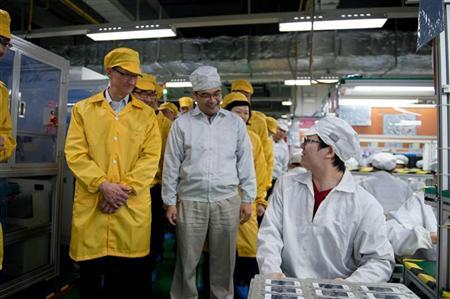 Working conditions at Foxconn’s gargantuan Chinese factories that assemble Apple Inc’s slick gadgets have barely improved despite pledges this year to halt labor violations, workers’ rights activists and employees said on Thursday.
Working conditions at Foxconn’s gargantuan Chinese factories that assemble Apple Inc’s slick gadgets have barely improved despite pledges this year to halt labor violations, workers’ rights activists and employees said on Thursday.
Foxconn Technology Group, Apple’s main global contract manufacturer run by Taiwanese tycoon Terry Gou and employing 1.2 million workers in China, has come under fire in recent years for running massive “sweatshops” to mass produce high-end iPads and iPhones.
Last month, Gou defended his firm’s industrial workshops that have helped outmuscle rivals through vast economies of scale and cost savings that have made it the world’s largest contract manufacturer.
“What’s wrong with sweatshops?” Gou told Chinese workers visiting Taiwan in late April. “We toil hard with blood and sweat, so long as we don’t break any laws. I believe in reaping what you sow,” he added in videoclip posted on YouTube. (here)
Following a spate of critical reports detailing unsafe factory practices at Foxconn plants that have triggered worker deaths and suicides, Apple this year allowed the U.S.-based Fair Labor Association (FLA) to conduct a high-profile and extensive probe of Foxconn’s China factories.
The report, released in March and based on 35,000 worker interviews, unearthed labor violations including extreme work hours and unpaid overtime. As a result, Apple and Foxconn pledged major improvements including cutting workloads, improving safety protocols and upgrading workers’ housing and quality of life.
A fresh report released on Thursday by labor watchdog Student & Scholars Against Corporate Misbehaviour (SACOM), based on visits to several Foxconn factories and 170 worker interviews, found rights violations “remain the norm” including high production targets, inhumane treatment and signs of overall salary cuts.
“The frontline management continue to impose humiliating disciplinary measures on workers,” it said.
“The above findings demonstrate that Apple and Foxconn have not turned over a new leaf,” the report added.
Like other China-focused labor advocacy groups, Hong Kong-based SACOM has released a number of hard-hitting and prominent reports on Foxconn in recent years.
Foxconn workers staged strikes in April at separate plants in northern and central China, including a group that threatened to collectively jump from a roof over pay and work conditions.
In response to SACOM’s report, Foxconn Technology Group and Apple said they would work to improve the working environment of workers and ensure that they are treated with respect.
“The welfare of our employees is without a doubt our top priority and we are working hard to give our more than one million employees in China a safe and positive working environment,” Foxconn Technology Group said.
Carolyn Wu, Apple’s spokeswoman in China, said that the U.S. technology giant insisted its suppliers provided safe working conditions and used environmentally responsible manufacturing processes when making Apple’s products.
“Our suppliers must live up to these requirements if they want to keep doing business with Apple,” Wu said.
TOO BIG, TOO COMPLICATED
Some labor activists said more needed to be done.
“I haven’t seen any real evidence of any significant changes,” said Geoffrey Crothall of China Labour Bulletin, another group which monitors Foxconn.
“At the moment they’re just tinkering around the edges and doing PR stunts … I don’t think there’s a short term fix to the situation at Foxconn. It’s too big, it’s too complicated.”
Crothall added that Foxconn needed to move towards greater dialogue with the workers through more representative unions.
“If they can move towards a more democratic system where the workers have a voice in their pay and conditions … you’ll find a much more content workforce.”
Some of the hundreds of thousands of workers now employed in Foxconn’s major industrial plants in southern China’s dusty Pearl River Delta near Shenzhen, corroborated SACOM’s findings.
“The work pressure is still great,” said a worker surnamed Wang who has worked at Foxconn’s complex in Guanlan making iPhones and other products over the past two years.
“There hasn’t been much change. We are still being pushed very hard,” he told Reuters by telephone.
Another employee made similar remarks.
The overall salaries of Foxconn workers dropped even though basic pay has increased, as overtime work has been cut, SACOM found. Some workers also had higher production targets and had to work unpaid overtime after pay hikes.
Source : Reuters




































